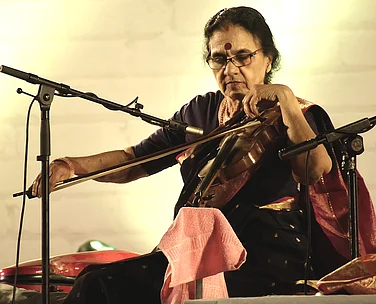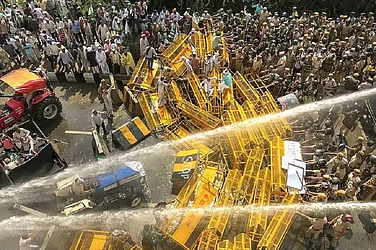It was initially supposed to be smooth sailing for the Trinamul Congress and the bjp. The rebels in the Congress were flocking to Mamata Banerjee, consequently rendering redundant Sonia Gandhi's decision to not be part of an alliance comprising the bjp. More importantly, the Left Front seemed over-burdened by the anti-incumbency factor. But then Tehelka happened, and a nervous Mamata left the nda, paving the way for a fresh realignment with the Congress. Even as details of the electoral arrangement between the Trinamul and the Congress were being worked out on Friday, there is little denying that the last-minute volte-face reflects poorly on its confidence. A poor index of Opposition unity traditionally favours the ruling formation. So, tentatively, it's advantage Left.
In fact, the Left has been the first off the blocks and has announced its candidates, published a new manifesto and held grassroots meetings. In contrast, the Opposition is recasting itself daily, relinquishing the aces it held earlier. The Trinamul-bjp, initially, announced their candidates but Mamata's withdrawal from the nda skewed all calculations. Worse, instead of the Congress and the Trinamul quickly coming to a deal, the negotiations between the two dragged on for five long days, each imposing preconditions on the other. Till Friday, the Trinamul-Congress hadn't apportioned the seats among themselves.
For all practical purposes, the Trinamul-bjp alliance is off. The bjp now proposes to contest all 294, for whatever it's worth. A triangular fight is conventionally considered tailormade for a Left victory.
Yet, Left Front leaders are not ecstatic over the confusion in the Opposition. For, the coming together of the Trinamul and the Congress means a possible consolidation of 39 per cent of the popular vote (on the basis of the 1999 Lok Sabha polls). The new equation will almost certainly transfer half the bjp's support base to the new Opposition combine, which could tot up to another
5-6 per cent votes. This means the Trinamul-Congress voteshare could equal the Left's 46.73 per cent of the 1999 Lok Sabha polls. No surprise, then, that senior cpi(m) leaders talk about winning not more than 150-160 seats, down from the current 203 seats.
Left leaders do not conceal the crucial importance of the split in non-Left votes. After the 1996 state assembly elections, a confidential cpi(m) note observed, "In the 1991 elections, we won 92 seats in Bengal because of the vote split between the Congress and the bjp. But in 1996, we had won 56 of these seats." The obvious unstated implication: the party must do all it can to encourage and perpetuate the division in the non-Left vote.
Worryingly, during the 1998 and 1999 Lok Sabha polls, the combined votebank of the Trinamul, bjp and Congress exceeded that of the Left Front by 4-5 per cent. No wonder Mamata was pressing to bring the three parties together under a Mahajot and ensure a direct contest between the Left and the Opposition. And though the Congress was reluctant to join an alliance comprising the bjp, several mlas left the party to join Mamata, thereby raising hopes of consolidating the Opposition.
Only weeks ago, the Left had its back to the wall and even suffered a split. But the Tehelka controversy, and Mamata's hasty resignation from the nda, suddenly reversed the fortunes. It now looks more united, cohesive and positive, with chief minister Buddhadeva Bhattacharyya looking confident and exuberant.
In contrast, Mamata has been keeping away from newsmen and partymen who are impatient and irritated over the tardy progress made in arriving at an agreement with the Congress. With Mamata having already announced candidates for a chunk of seats, she might in the new arrangement have to contend with the phenomenon of rebel candidates.
There are other cheers for the LF. Mamata's decision to quit the nda has also wrecked the understanding she had forged with the Kamtapuri People's Party in north Bengal. Two, the Saifuddin Choudhury-led Party for Democratic Socialism has said that it won't join an alliance comprising the Congress.
Not only is the non-Left block divided, it also can't match the Left's party machinery. But what could stand between the Left and power is the way the dead weight of a quarter century of Left rule could influence the final verdict.
The Split Difference
WEST BENGAL: Strength of the House: 294

The Split Difference
The Split Difference
Published At:
MOST POPULAR
WATCH
MORE FROM THE AUTHOR
×

















